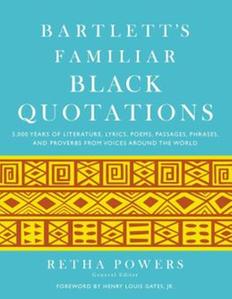
What were the challenges of compiling the first Bartlett's Familiar Black Quotations? "5,000 years" sounds daunting!
The first challenge was that I started with 19th- and 20th-century speakers and worked my way out from there, rather than taking a more linear approach from ancient times to the present. Even today, speakers such as Booker T. Washington, W.E.B. Du Bois, Ida B. Wells-Barnett and Mary McLeod Bethune are representative of a significant period of recorded black thought, and a harbinger of emerging black literature. But how did they arrive there? I sought to answer this by looking at their influences and predecessors, and in turn who they influenced and resonate with. I also wanted to introduce readers to folks who may be less-well known in popular history but who said things that were significant for the time, words that continue to be relevant in historical context or that are echoed by contemporary speakers.
Another challenge was discovering strong quotations--quotes with zing and weight--from a number of people known more for their personalities and positions than what they actually said. I recognized that readers would be looking for these speakers, but I was challenged to find original and significant words.
For other speakers, the quotations were more obvious: "I have a dream that my four little children will one day live in a nation where they will not be judged by the color of their skin, but by the content of their character," but with Martin Luther King, Jr., for example, in order to represent the full scope of his thinking and wide-ranging influence, I needed to source his lesser-known quotations as well.

As I write in my introduction, building Bartlett's Familiar Black Quotations was an act of "reaching back and reaching forward." My intention was to create a book that reflects diversity of black thought and experiences and, like its predecessor, represents a range of enduring quotations that are timeless or emblematic of the times. In the 16th century, King Afonso wrote of the Atlantic slave trade, "We cannot reckon how great the damage is.... They grab them and cause them to be sold; and so great, Sir, is their corruption and licentiousness that our country is being utterly depopulated." This quote can only begin to foreshadow how the slave trade would change world history. For black people enslaved in Europe, the Caribbean and the Americas, the focus became freedom and escape from the institution of slavery. But that's not the entire story. In trying to represent the fullest scope of the black experience across history, I also include musings on the nature of being human, e.g., "Zounds! If alive--what ails you?" (Ignatius Sancho), along with ones on freedom, love, self-definition and identity, and of course poetry and humor. Finally, I wanted the scope to be as international as possible.
What is the role of music and lyrics in the book?
I am by no means the first person to observe that black music has had tremendous impact on world culture. This is true both today as well as historically, looking at the ways that enslaved people used music to mediate, hide information, protest, cope and celebrate. A great deal of the wisdom and witticisms of black folks can be found in spirituals, the blues, jazz, r&b and hip hop. These lyrics have always referred back and forth, whether it's the person who sang "And before I'd be a slave, I'll be buried in my grave,/ And go home to my Lord and be free," or Marvin Gaye asking "What's Going On?" ("Mother, Mother, there's too many of you crying/ Brother, brother, brother, there's far too many of you dying.") The influence of music is found in the echo of the blues written in the poetry of Gwendolyn Brooks and Langston Hughes. Music and lyrics didn't simply provide a soundtrack, but a sounding board and source for dialogue and language.
Why did you include quotations that use the "N-word"?
As Farai Chideya says, ""N****r" is the all-American trump card, the nuclear bomb of racial epithets." In Their Eyes were Watching God, Nanny laments to Janie "De n****r woman is de mule uh de world so fur as Ah can see. Ah been prayin' fuh it tuh be different wid you." In an essay, Ralph Ellison wrote that it was one of the first slurs European immigrants "learned when they got off the boat" and that "it made them feel instantly American." Some think that the way to eliminate this power is to stop using the word altogether, and others believe we should embrace it and/or redefine it in order to defuse it. It is a complicated question, and while both approaches are flawed, the discussion is ongoing so the references in BFBQ accumulated.
Why Bartlett's Familiar Black Quotations now?
This year alone marks the 150th anniversary of the Emancipation Proclamation, the 50th anniversary of the March on Washington, and the second term of the first black president of the United States. These are some of the more dramatic touchstones in the United States alone that make it clear that Bartlett's Familiar Black Quotations embodies a sweeping history. But quotations are not limited to the past; while they can function as time capsules, more often quotations offer timeless words of inspiration that span far beyond the here and now. --Marilyn Dahl, editor, Shelf Awareness for Readers

